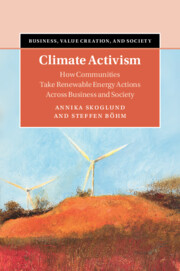Book contents
- Climate Activism
- Business, Value Creation and Society
- Climate Activism
- Copyright page
- Contents
- Figures
- Foreword
- Preface
- Acknowledgements
- Introduction
- 1 Boundaryless Activism
- 2 The Activist–Business–State Conglomeration
- 3 Activism and Its Collective Force
- 4 Epistemic Community
- 5 Climate Activism at Vattenfall
- 6 Climate Activism via Small and Medium-Sized Enterprises
- 7 Climate Activism in Governmental Authorities
- 8 Climate Activism via Citizen Groups
- 9 New Ways of Knowing
- 10 Horizontal Organising
- Appendix
- References
- Index
10 - Horizontal Organising
Published online by Cambridge University Press: 09 November 2022
- Climate Activism
- Business, Value Creation and Society
- Climate Activism
- Copyright page
- Contents
- Figures
- Foreword
- Preface
- Acknowledgements
- Introduction
- 1 Boundaryless Activism
- 2 The Activist–Business–State Conglomeration
- 3 Activism and Its Collective Force
- 4 Epistemic Community
- 5 Climate Activism at Vattenfall
- 6 Climate Activism via Small and Medium-Sized Enterprises
- 7 Climate Activism in Governmental Authorities
- 8 Climate Activism via Citizen Groups
- 9 New Ways of Knowing
- 10 Horizontal Organising
- Appendix
- References
- Index
Summary
Climate activists across generations and borders demonstrate in the streets, while people also take climate actions via everyday professional efforts at work. In this dispersal of climate actions, the pursuit of personal politics is merging with civic, state and corporate commitment to the point where we are witnessing a rebirth of togetherness and alternative ways of collective organising, from employee activism, activist entrepreneurship, to insider activism, shareholder activism and prosumer activism. By empirically investigating this diffuse configuration of the environmental movement with focus on renewable energy technology, the commercial footing of climate activism is uncovered. The book ethnographically illustrates how activism goes into business, and how business goes into activism, to further trace how an ‘epistemic community’ emerges through co-creation of lay knowledge, not only about renewables, but political action itself. No longer tied to a specific geographical spot, organisation, group or even shared political identity, many politicians and business leaders applaud this affluent climate ‘action’, in their efforts to reach beyond mere climate ‘adaptation’ and speed up the energy transition. Conclusively, climate activism is no longer a civic phenomenon defined by struggles, pursued by the activist as we knew it, but testament of feral proximity and horizontal organising.
Keywords
- Type
- Chapter
- Information
- Climate ActivismHow Communities Take Renewable Energy Actions Across Business and Society, pp. 225 - 247Publisher: Cambridge University PressPrint publication year: 2022

